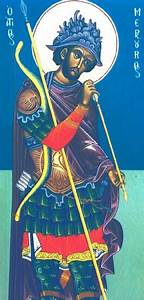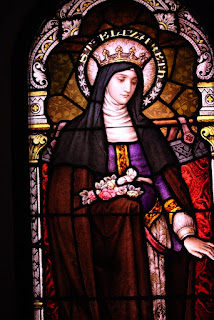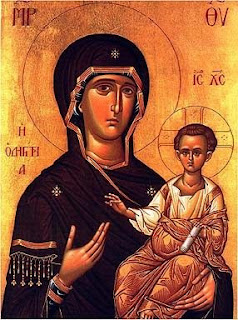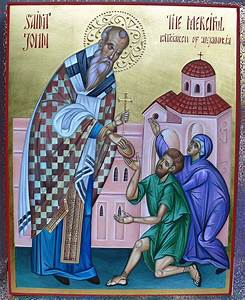I learned the rosary from an Anglo-Catholic priest. He knew the history of the rosary quite well and never prayed the luminous mysteries. I don't have any judgment toward those who do, but for me, the rosary will always be prayed with the full 150 Hail Mary's to remember the 150 Psalms.
I wanted to write this for people unfamiliar with the rosary. It is a very beautiful devotion though often misunderstood. The rosary is quite a scriptural prayer and takes on the prophetic narrative of the 150 Psalms and how they are fulfilled in the Gospel. For instance, Mary’s intercession on behalf of sinners is seen in John 2:1-12. She stands at the side of the King (Psalm 45:1-9) and is always present in his life. One needs to become acquainted with the Psalms though to see how Mary is prophetically seen alongside her son in his mission but this is why the rosary has three sets of mysteries. The joyful, sorrowful, and luminous mysteries. Not only do they recount the prophetic detail of the Psalms but also the prophetic detail of Mary’s participation in Jesus’s life. What initially started as 150 Psalms became 150 Our Father’s and then 150 Hail Mary’s.
So here is the basics on how to pray the rosary.
Start with the crucifix saying the Apostle’s Creed–
I believe in God,
the Father almighty,
Creator of heaven and earth,
and in Jesus Christ, his only Son, our Lord,
who was conceived by the Holy Spirit,
born of the Virgin Mary,
suffered under Pontius Pilate,
was crucified, died and was buried;
he descended into hell;
on the third day he rose again from the dead;
he ascended into heaven,
and is seated at the right hand of God the Father almighty;
from there he will come to judge the living and the dead.
I believe in the Holy Spirit,
the holy catholic Church,
the communion of saints,
the forgiveness of sins,
the resurrection of the body,
and life everlasting. Amen.
Next, pray the Our Father holding the next bead–
Our Father, Who is in heaven,
Holy is Your Name;
Your kingdom come,
Your will be done,
on earth as it is in heaven.
Give us this day our daily bread,
and forgive us our sins,
as we forgive those who sin against us;
and lead us not into temptation,
but deliver us from evil. Amen.
On the next three beads, three Hail Mary’s–
Hail Mary, full of grace.
Our Lord is with you.
Blessed are you among women,
and blessed is the fruit of your womb,
Jesus.
Holy Mary, Mother of God,
pray for us sinners,
now and at the hour of our death.
Amen.
On the next bead, pray the Glory Be and optional Fatima prayer–
Glory be to the Father, and to the Son, and to the Holy Ghost. As it was in the beginning, is now, and ever shall be, world without end. Amen.
O my Jesus, forgive us of our sins. Save us from the fires of Hell. Especially those in most need of your mercy. Amen.
Then begins the first Our Father introducing the first decade. An Our Father introduces the decade, and then the mystery is announced. Normally, information on the rosary does not specify the mystery, however, for our purposes, we will identify each one as I am most interested in explaining a full rosary which will give the 150 Hail Mary’s reflecting on the prophetic message of the Psalms.
After saying the Our Father, the joyful mysteries are begun. They start with the Annunciation. This is announced followed by 10 Hail Mary’s. Afterward, a Glory Be and optional Fatima prayer and whatever intercessions desired are made.
Then another Our Father and the Visitation of Mary’s to Elizabeth is the next joyful mystery. This is announced followed by 10 Hail Mary’s. Afterward, a Glory Be and optional Fatima prayer and whatever intercessions desired are made.
Then another Our Father and the next mystery is the Nativity. This is announced followed by 10 Hail Mary’s. Afterward, a Glory Be and optional Fatima prayer and whatever intercessions desired are made.
Then another Our Father and the next mystery is the Presentation of Jesus in the Temple. This is announced followed by 10 Hail Mary’s. Afterward, a Glory Be and optional Fatima prayer and whatever intercessions desired are made.
Then another Our Father and the next mystery is the Finding of Jesus in the Temple. This is announced followed by 10 Hail Mary’s. Afterward, a Glory Be and optional Fatima prayer and whatever intercessions desired are made. This concludes the joyful mysteries. The sorrowful mysteries are then transferred to as you pick up normally.
An Our Father is said and the first sorrowful mystery is the Agony in the Garden of Gethsemane. This is announced followed by 10 Hail Mary’s. Afterward, a Glory Be and optional Fatima prayer and whatever intercessions desired are made.
Then another Our Father and the next mystery is the Scourging at the Pillar. This is announced followed by 10 Hail Mary’s. Afterward, a Glory Be and optional Fatima prayer and whatever intercessions desired are made.
Then another Our Father and the next mystery is the Crowning with Thorns. This is announced followed by 10 Hail Mary’s. Afterward, a Glory Be and optional Fatima prayer and whatever intercessions desired are made.
Then another Our Father and the next mystery is the Carrying of the Cross. This is announced followed by 10 Hail Mary’s. Afterward, a Glory Be and optional Fatima prayer and whatever intercessions desired are made.
Then another Our Father and the final sorrowful mystery is the Crucifixion. This is announced followed by 10 Hail Mary’s. Afterward, a Glory Be and optional Fatima prayer and whatever intercessions desired are made.
This concludes the sorrowful mysteries as the glorious mysteries are next transitioned to which complete the prophetic nature of the Psalms. If we go to Hebrews 1:1-12, we see many Psalms are fulfilled in the resurrection. In addition, St Peter cites numerous Psalms, specifically Psalm 110:1 in Acts 2 related to the resurrection. There are three glorious mysteries which refer to our own resurrection–the resurrection of Christ which we are to become incorporated into, the descent of the Holy Spirit at Pentecost in which our baptism is a major part and we are joined to Christ’s resurrection in baptism (Rom. 6:3-4), and the Assumption of Mary which reveals Mary’s own resurrection from the grave to be foreshadowing of our own resurrection.
An Our Father is said as the glorious mysteries are announced. The first of which is the Resurrection of Christ. This is announced followed by 10 Hail Mary’s. Afterward, a Glory Be and optional Fatima prayer and whatever intercessions desired are made.
Another Our Father is said. The next mystery is the Ascension of Christ into Heaven. This is announced followed by 10 Hail Mary’s. Afterward, a Glory Be and optional Fatima prayer and whatever intercessions desired are made.
Then an Our Father is said and the next mystery is the Descent of the Holy Spirit at Pentecost. This is announced followed by 10 Hail Mary’s. Afterward, a Glory Be and optional Fatima prayer and whatever intercessions desired are made.
Then an Our Father is said and the next mystery is the Assumption of Mary. This is announced followed by 10 Hail Mary’s. Afterward, a Glory Be and optional Fatima prayer and whatever intercessions desired are made.
Then an Our Father is said and the last glorious mystery is the Coronation of the Ever-Virgin. This is announced followed by 10 Hail Mary’s. Afterward, a Glory Be and optional Fatima prayer and whatever intercessions desired are made.
There is one more prayer–the Hail Holy Queen.
Hail, holy Queen, Mother of mercy, hail, our life, our sweetness and our hope. To thee do we cry, poor banished children of Eve: to thee do we send up our sighs, mourning and weeping in this vale of tears. Turn then, most gracious Advocate, thine eyes of mercy toward us, and after this our exile, show unto us the blessed fruit of thy womb, Jesus, O merciful, O loving, O sweet Virgin Mary! Amen.
This concludes the rosary.













